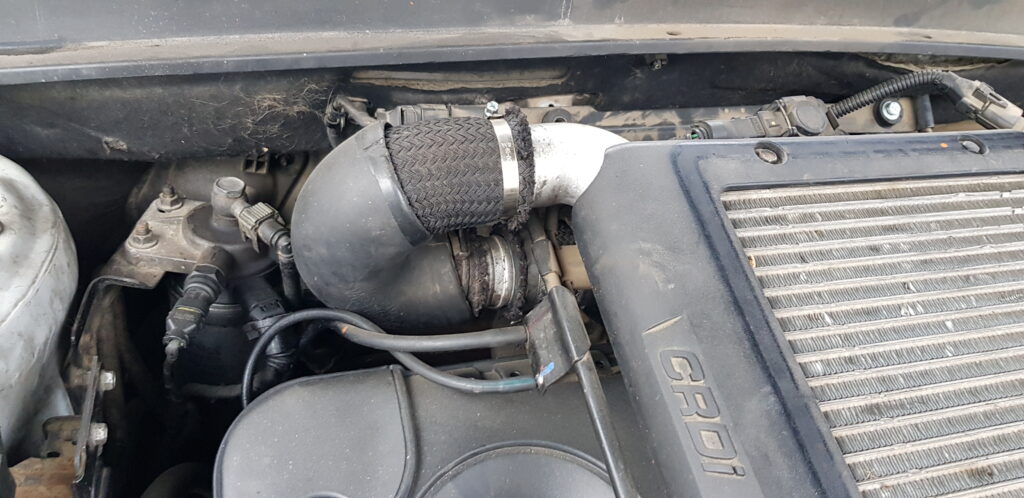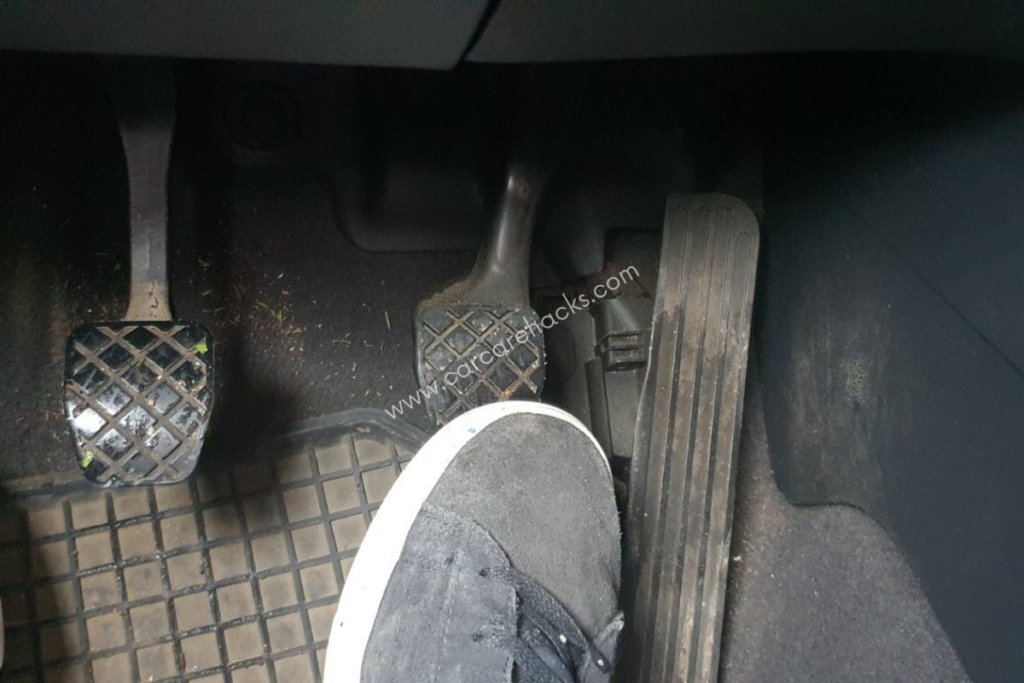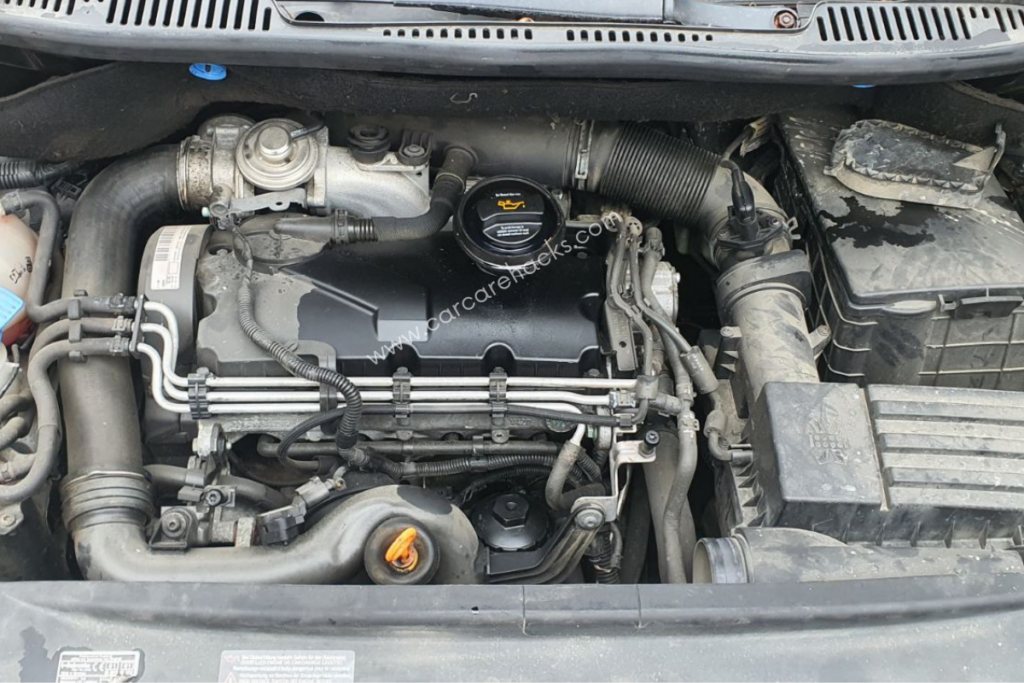Almost all cars make some sort of noise when you turn them on. Even if your car is in perfect running condition, it will most likely emit a noise or two the first time you start it in the morning.
This article will look at 10 common automotive noises and attempt to explain why they are occurring.
No one can definitely say what’s causing your specific problem without actually hearing them in person. However, this article provides the most common vehicle noises and explanations.
- Key Takeaway
- 10 Most Common Vehicle Noises
- Tapping or knocking sound coming from the engine
- Gurgling noises when accelerating
- Pinging or ticking noises coming from the engine compartment
- Whining noises when the engine is running
- Metal banging noises when you accelerate or brake
- Clicking noise from the engine on cold start
- Loud whine noise during acceleration
- Metal-on-metal sound while idling
- Loud clicking noise when accelerating
- Clicking noise when you turn on your car or come to a stop
- Loud clacking noise that’s not present when idling
- Loud clacking noise when accelerating
- Ticking sounds coming from inside the car when accelerating
- FAQs
- Q: What causes rattling noise in a car?
- Q: Why does my car make a whining noise?
- Q: What does it mean if my car is making a clicking noise?
- Q: What should I do if my car is making a grinding noise?
- Q: How do I fix a squealing noise in my car?
- Q: Why is it important to address car noises?
- Q: What does it mean if my car is making a clunking noise?
- Q: Why is my car making a noise when turning?
- Q: What are some car noises that should never be ignored?
- In Conclusion
Key Takeaway
- The most common vehicle noises include screeching or grinding when braking, rumbling or roaring which is likely an exhaust issue, droning noise, knocking sound from the engine, rattling often related to loose parts, hissing suggesting a possible coolant leak, high-pitched squeal indicating belt issues, and clicking sounds.
10 Most Common Vehicle Noises
- A tapping or knocking sound coming from the engine is usually caused due to fuel condensation from leaving the car sitting for an extended period of time.
- Gurgling noises when accelerating are usually caused by air bubbles in the fuel system.
- Pinging or ticking noises coming from the engine compartment due to exhaust manifold leak or warped valve stem seals.
- Whining noises when the engine is running are caused by a bad serpentine belt.
- Metal banging noises when you accelerate or brake due to a bad torque converter clutch.
- Clicking noise from the engine on cold start due to low oil pressure.
- Loud whining noise during acceleration due to bad belts.
- Metal-on-metal sound while idling due to bad motor mounts.
- Loud clacking noise that’s not present when idling due to bad timing chain tensioner.
Tapping or knocking sound coming from the engine

One of the loudest noises that any car can make is “tapping” or “knocking”. It’s not unusual for older vehicles to have some degree of tapping because as gasoline and oil get older and start to break down, they form deposits on the cylinders, valves, and spark plugs. These deposits can build up in worn-out engines and eventually cause them to fail.
However, tapping sounds that occur when a car is first started are probably caused by fuel condensation in the engine. When a car sits for an extended period of time (overnight or longer) with gas still in the tank, moisture from the air collects on the cylinder walls and other components inside the engine.
You can usually hear this happen because it sounds like someone is gently rapping their knuckles against your engine block. This noise occurs more often when ambient temperatures are extremely high or low – such as during the summer and winter months.
Gurgling noises when accelerating

One of the most common noises that a car makes is a gurgling, bubbling, or rumbling noise when you accelerate. This is often caused by air bubbles in the fuel system. It can usually be fixed with an inexpensive repair such as replacing the fuel filter.
All internal combustion engines require some amount of air mixed with gasoline to run properly. This mixture is typically drawn from the atmosphere via a small vent hole near the throttle body.
When there’s not enough air mixed into the gas, your engine will begin to misfire and sputter. If it’s acting up during colder weather, this may be due to the hardening of certain types of low-temperature grade fuel.
Other than some kind of additive such as MMT, there’s usually no way to correct this condition. The only other thing you can do is replace the fuel injectors because they may be getting clogged up.
Pinging or ticking noises coming from the engine compartment

One of the most common noises that car owners will hear is an occasional “ticking” or ”pinging” sound coming from their engine compartment. If your car has a four-cylinder or six-cylinder engine, it may just be an exhaust manifold leak or warped valve stem seal.
These are not serious problems and you should have them checked out at least once every two years. Or more often if you hear these sounds frequently.
This noise could also be caused by something simple like the catalytic converter. These components are designed to emit a “pinging” noise when they reach a very high temperature (about 1,000 degrees Fahrenheit).
This sound is your car’s way of letting you know that it’s time for an oil change because the metal is starting to break down in this area.
Whining noises when the engine is running
If your engine is making some irregular whining or whirring sounds when it’s running, there may be several reasons why this is happening. One of the most common noises heard is caused by an unbalanced serpentine belt.
Most cars nowadays have more than one belt working together to operate various components inside the engine bay – such as the alternator and power steering pump.
The type of belt that causes this noise is typically made from some kind of rubber and it has a series of “teeth” or small grooves on one side.
This design allows all the accessories to work together with the crankshaft without slipping or skipping – while also saving energy at the same time.
If you hear whining, popping or squealing noises coming from your engine bay when you accelerate, there’s probably an unbalanced (or loose) belt somewhere in your vehicle.
Another possible reason why you’re hearing these sounds is that your serpentine belt may be starting to break apart or come off. This condition will usually cause more problems than just a rattle. It can affect how well all the belts and components operate under load.
Metal banging noises when you accelerate or brake

On a non-interference engine, a small silicone gaiter is positioned in the torque converter housing to keep dirt and debris from entering the speedometer gear assembly. If this gasket fails, it will allow contaminants into the oil. This can cause severe damage to your transmission if not corrected right away.
A bad or failing torque converter clutch (TCC) solenoid may also be to blame for noise that sounds like metal banging on metal when you accelerate or apply the brake pedal .
The TCC is responsible for disengaging and engaging the torque converter at certain speeds. If it’s faulty, it will make an audible “clicking” noise acceleration and a whining noise when you let off the gas.
Clicking noise from the engine on cold start

If you hear a “clicking” sound coming from your engine on cold mornings, it may be trying to open up the thermostat. Most cars today have what’s called a one-piece or two-piece plastic opening assembly that has no springs and doesn’t make any noise.
Other than some oil dripping out of it, you really won’t know for sure if the seal is broken until your car starts overheating.
Another common cause of this noise is air trapped inside the cooling system after installing a new water pump. When an electric fan motor gets its power back after starting up, it will sometimes “hum” or whine instead of running quietly because of this condition.
If you have a belt-driven fan, it could also be making noise if the idler pulley is worn out or has become misaligned during installation.
You’ll usually hear a loud “clicking” sound when your engine tries to start on cold mornings. It is hard for oil to flow into all the components that need lubrication when it’s extremely cold outside.
Your car may also make some popping noises if your coolant temperature sensor comes loose after removing the old water pump. This causes the PCM to keep trying to open up the thermostat over and over again until everything warms up.
A tapping noise only while revving could indicate there are several problems with your valvetrain, including bent pushrods, defective rocker arms, and worn-out lifters.
More serious conditions like a broken timing belt can also cause tapping noises if the camshaft position sensor is going bad or the front engine seal starts to leak after it’s overheated.
Loud whine noise during acceleration
A loud whine only during acceleration could mean your accessory drive belts are misaligned, loose, or slipping. This may be caused by a faulty idler pulley, tensioner pulley, or V-belt. Belts that have become contaminated with oil from internal leakage on the engine will slip more easily. This is because they’re not getting enough horsepower from the alternator to remain taut.
If your power steering pump makes a high-pitched squealing noise when you turn the steering wheel, it’s usually a sign that there’s not enough belt tension because the idler pulley is going bad.
Metal-on-metal sound while idling

The dreaded metal-on-metal sound can be your worst nightmare if your vehicle is trying to idle by a brake. This condition occurs when the throttle body sticks open while traveling at high speeds and then closes all of a sudden. This causes the engine to stall out until you either shut off the ignition or press on the accelerator pedal.
When this happens, it will usually pop loudly and feel like a miss in your engine. If your car has been making this noise for several minutes before stopping, don’t wait. Shut off the engine right away because you may have blown a piston. It could also mean your throttle body is dirty, sticking, or misadjusted.
Loud clicking noise when accelerating
A loud “clicking” noise when accelerating can be caused by several things – including vacuum leaks, an inefficient or defective torque converter clutch solenoid, a failing speed sensor, a bad idle air control valve, worn-out transmission bushings, or failing bearings inside the transmission.
Either way, these are all better deals than paying for a new catalytic converter! If your car only makes this sound when it’s cold outside and not during hot weather – check to see if the starter relay has gone bad after being exposed to moisture over time.
This low-amp relay allows enough power from the battery to flow into the starter solenoid during cold weather.
Clicking noise when you turn on your car or come to a stop
Most “worn-out” motor mounts are actually just old and dry. As they age, rubber bushings will absorb more moisture and lose their ability to maintain their shape over time. If your car makes a loud “clicking” noise when you turn it on or come to a stop, the engine mount supports may be worn out, broken, or missing – which can also cause uneven tire wear.
This noisy condition is often caused by loose bolts holding down the camshaft position sensor. But, it could also be due to an internal leak at the front crankshaft seal.
You may hear this sound coming from one particular cylinder bank if your knock sensor is bad. However, it will usually only occur when accelerating or coming to a stop.
Loud clacking noise that’s not present when idling
A loud “clacking” noise that’s not present when idling can be caused by the timing chain tensioner sticking – which may be due to misaligned valves, worn-out hydraulic lifters, or high mileage.
On models with overhead cams (OHC), this condition is often accompanied by an engine oil leak at the front crankshaft seal because one of the intake camshafts is probably loose.
Loud clacking noise when accelerating
A loud “clacking” noise when accelerating may indicate excessive clearance between camshaft lobes and lifters – which is usually the result of an oil leak at either one or both of the front crankshaft seals.
If you don’t have an oil leak, check to see if you have a low-mileage vehicle by checking your spark plug gaps – which should all measure somewhere around 0.052 inches +/- 0.002 inches for optimum performance.
An engine that’s been operating most of its life at high speeds will usually develop lash in the valve train, while low-mileage vehicles will often run into other problems before this occurs.
Replacing camshafts and lifters may be necessary after mileage accumulates past 90,000 miles (150,000 km) if the valve lash gets too great – which can make the valves open up far enough to hit the pistons.
A loud “buzzing” sound when accelerating could also mean something’s wrong with your power steering or alternator belt. A worn serpentine belt tensioner could also be a factor if it’s not set to the correct tension.
Ticking sounds coming from inside the car when accelerating
If you hear ticking sounds coming from inside your car when accelerating, this could mean that one of the engine valves isn’t holding or losing tension on its hydraulic lifter – which can cause valve lash to get too great over time.
This condition may only be noticeable when cold because the lifter may not make noise when warmed up.
FAQs
Q: What causes rattling noise in a car?
A: A rattling noise in your car can be caused by loose parts, such as a heat shield, exhaust system, or suspension components.
Q: Why does my car make a whining noise?
A: A whining noise in your car can be attributed to a number of issues, including problems with the power steering system, a worn-out belt, or a malfunctioning wheel bearing.
Q: What does it mean if my car is making a clicking noise?
A: If your car is making a clicking noise, it could indicate a problem with the CV joint, a faulty spark plug, or issues with the power steering pump.
Q: What should I do if my car is making a grinding noise?
A: If your car is making a grinding noise, it is likely due to worn-out brake pads or a problem with the brake rotors. It is important to have this issue addressed by a mechanic as soon as possible.
Q: How do I fix a squealing noise in my car?
A: A squealing noise in your car can be caused by worn-out brake pads, a loose or worn-out belt, or problems with the power steering fluid. To fix this issue, you may need to replace the brake pads, tighten or replace the belt, or check and refill the power steering fluid.
Q: Why is it important to address car noises?
A: Car noises can indicate a problem or potential issue with your vehicle. Ignoring these noises can lead to further damage and expensive repairs down the line. It is important to address car noises promptly to prevent further issues.
Q: What does it mean if my car is making a clunking noise?
A: A clunking noise in your car can be caused by a loose or worn-out suspension component, a problem with the exhaust system, or issues with the wheel bearings. It is recommended to have a mechanic inspect and repair the issue.
Q: Why is my car making a noise when turning?
A: If your car is making a noise when turning, it could be due to a worn-out CV joint or problems with the power steering system. It is best to have a mechanic diagnose and fix the issue.
Q: What are some car noises that should never be ignored?
A: Some car noises that should never be ignored include grinding, squealing, rattling, clunking, and whining noises. These noises can indicate serious issues with your vehicle that require immediate attention says VAtire.
In Conclusion
The most common vehicle noises can be a sign of major trouble lurking beneath the surface.
Without proper attention, these issues can quickly get out of hand and cause more damage than necessary.
